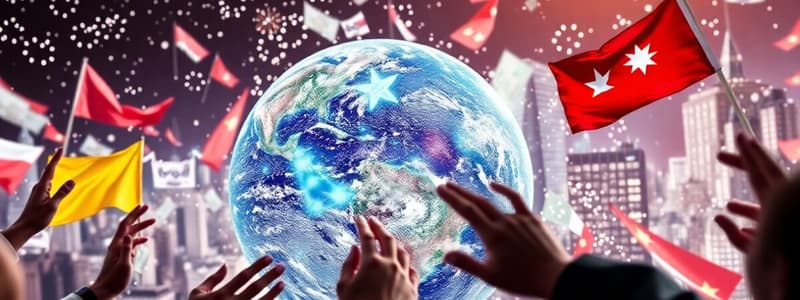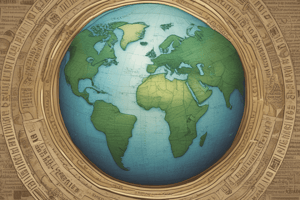Podcast
Questions and Answers
What term describes the ability of individuals or groups to influence others and control resources?
What term describes the ability of individuals or groups to influence others and control resources?
- Culture
- Power (correct)
- Network
- Place
Which organization is primarily associated with shaping global economic policies?
Which organization is primarily associated with shaping global economic policies?
- North Atlantic Treaty Organization
- World Health Organization
- World Trade Organization
- International Monetary Fund (correct)
What is a predominant impact of global supply chains on local economies?
What is a predominant impact of global supply chains on local economies?
- Influencing labor markets (correct)
- Reduction in global trade
- Increased local production
- Consistent employment levels
Which of the following best describes cultural power in the context of globalization?
Which of the following best describes cultural power in the context of globalization?
What initiative aims to enhance trade and infrastructure development across Asia, Europe, and Africa?
What initiative aims to enhance trade and infrastructure development across Asia, Europe, and Africa?
Which term describes the interconnected systems facilitating the flow of people, goods, and information?
Which term describes the interconnected systems facilitating the flow of people, goods, and information?
What recent trend is depicted by the rise of the BRICS nations?
What recent trend is depicted by the rise of the BRICS nations?
What is a major criticism of transnational corporations like Apple Inc.?
What is a major criticism of transnational corporations like Apple Inc.?
What does the term 'placelessness' refer to in the context of globalization?
What does the term 'placelessness' refer to in the context of globalization?
Which of the following best describes the Core-Periphery Model?
Which of the following best describes the Core-Periphery Model?
What was a significant challenge faced by Dubai in its transformation to a global city?
What was a significant challenge faced by Dubai in its transformation to a global city?
How does the 'digital divide' specifically affect developing countries?
How does the 'digital divide' specifically affect developing countries?
What is a primary goal of the Fair Trade Movement?
What is a primary goal of the Fair Trade Movement?
Which environmental issue is exacerbated by networked economies according to the content?
Which environmental issue is exacerbated by networked economies according to the content?
What does 'glocalization' involve?
What does 'glocalization' involve?
What impacts does the demand for soy and beef have on the Amazon Rainforest?
What impacts does the demand for soy and beef have on the Amazon Rainforest?
Flashcards
Power
Power
The ability to influence others and control resources.
Places
Places
Locations with unique physical and human characteristics.
Networks
Networks
Systems of interconnected nodes facilitating flow.
Globalization
Globalization
Signup and view all the flashcards
Transnational Corporations (TNCs)
Transnational Corporations (TNCs)
Signup and view all the flashcards
Belt and Road Initiative (BRI)
Belt and Road Initiative (BRI)
Signup and view all the flashcards
Emerging Economies
Emerging Economies
Signup and view all the flashcards
Regional Power Blocs
Regional Power Blocs
Signup and view all the flashcards
Sense of Place
Sense of Place
Signup and view all the flashcards
Placemaking
Placemaking
Signup and view all the flashcards
Globalization and Placelessness
Globalization and Placelessness
Signup and view all the flashcards
Core-Periphery Model
Core-Periphery Model
Signup and view all the flashcards
Inequality in Networks
Inequality in Networks
Signup and view all the flashcards
Resource Extraction
Resource Extraction
Signup and view all the flashcards
Grassroots Movements
Grassroots Movements
Signup and view all the flashcards
Fair Trade Movement
Fair Trade Movement
Signup and view all the flashcards
Study Notes
Key Concepts
- Power: The capacity to influence others and control resources.
- Places: Locations shaped by social, economic, and political forces.
- Networks: Systems of interconnected nodes facilitating flows of people, goods, and information.
- Globalization: Increasing interconnectedness of the world through various networks.
Global Interactions and Power
- Economic Power: Transnational corporations (TNCs) dominate global trade and investment; global financial institutions (e.g., World Bank, IMF) shape economic policy.
- Political Power: Nation-states and supranational organizations (e.g., UN, EU) exert influence; geopolitical tensions arise over resources and territory.
- Cultural Power: Dominant cultures spread through media and globalization; resistance to homogenization exists, safeguarding local traditions and indigenous rights.
Networks and Flows
- Transport Networks: Include roads, railways, airports, and shipping routes.
- Communication Networks: Consist of the internet, social media, and telecommunications.
- Trade Networks: Refer to global supply chains and agreements like WTO and NAFTA.
- Network Impacts: Encourage economic growth, increased mobility, and environmental consequences like emissions and resource depletion.
Global Shift in Power
- Emerging Economies: The rise of BRICS nations (Brazil, Russia, India, China, South Africa) signifies a shift from a unipolar to a multipolar world.
- Regional Power Blocs: Groups like the EU, ASEAN, and AU promote regional integration and tackle global challenges.
Places and Identity
- Sense of Place: Emotional and cultural ties to a location, shaped by history and personal experiences.
- Placemaking: Creating meaningful spaces (e.g., urban parks, cultural centers).
- Globalization and Placelessness: Homogenization through global brands and standardized architecture potentially diminishes local identity.
Power and Inequality
- Core-Periphery Model: Wealthy, developed regions (core) hold economic and political power; less developed ones (periphery) are dependent.
- Inequality in Networks: Unequal access to transport, communication, and trade networks exists; a digital divide separates developed and developing countries.
Environmental Impacts of Networks
- Resource Extraction: Exploitation of natural resources (e.g., mining, deforestation) negatively affects ecosystems and communities.
- Pollution and Waste: Transportation networks generate carbon emissions; global consumption leads to electronic waste.
Resistance and Alternatives
- Local Resistance: Grassroots movements resist globalization, preserving local cultures.
- Alternative Networks: Fair trade, ethical consumption, and localized production offer alternatives.
Key Terms
- Globalization: Increasing interconnectedness and interdependence.
- Glocalization: Adapting global products and ideas to local contexts.
- Time-Space Compression: Reduced time and distance due to technology.
- Network Society: A society shaped by digital networks and information.
Exam Tips
- Use specific examples (e.g., Apple, the Silk Road, Dubai).
- Analyze power's role in shaping places and networks.
- Evaluate globalization's impacts on various regions and communities.
Studying That Suits You
Use AI to generate personalized quizzes and flashcards to suit your learning preferences.




